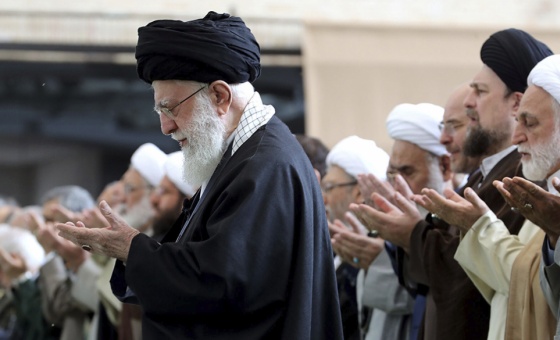This is the last article you can read this month
You can read more article this month
You can read more articles this month
Sorry your limit is up for this month
Reset on:
Please help support the Morning Star by subscribing here
SO, the Liz Truss era dawns. Where is the Breughel or even the Bosch who could do justice to the scene?
Ascending to the applause of a coterie of gnarled but wealthy reactionaries, she presides over the blasted landscape of a broken country — citizens huddling together for the only affordable warmth, trains immobilised en route to excrement-covered beaches, leaking pipes, empty shop shelves and overwhelmed hospitals.
The guns of war would be thundering in the distance, in honour of the new warrior queen, who would be festooned Margaret Thatcher-style in her battle helmet.
There would even be room for an aircraft carrier drifting listlessly just outside port, marooned by malfunction on a mission to intercept the destitute in their dinghies.
You could also squeeze onto the canvas a coterie of fat cats rubbing their hands together in anticipation of their new leaders’ largesse, as well as perhaps Boris Johnson’s backside as he exits the scene.
A corner should be left blank for the viewer to draw in their own preferred leader of the opposition — Mick Lynch? Andy Burnham? Ash Sarkar? Marcus Rashford?
Our fourth Tory premier in the last six years of mounting crises advises that she will govern this tormented realm “as a conservative.” Well, yes, but — a David Cameron conservative imposing savage austerity, a Theresa May social conservative spreading a hostile environment, or a Boris Johnson conservative handing out millions to cronies while trashing public institutions?
I fear Truss may be all of the above and more. The government she leads could prove to be the most reactionary since Thatcher — and possibly since the Duke of Wellington.
Truss’s mandate from Tory members was a much thinner one than expected, and as this column is being written she is understood to be assembling a Cabinet drawing more or less exclusively on her own supporters, themselves only a fraction of parliamentary Tories.
She really represents only a minority in the House of Commons, never mind the country.
One of two things will happen — either Truss decides she wants to win the next election and tiptoes away from the extremes of her sub-Thatcherite leadership election rhetoric — dumping leadership election pledges need not be fatal, as Keir Starmer has more than adequately proved.
Or the Tory Party decides the election is as good as lost and instead makes the most of the next two years by implementing the hard-right programme they dream of and she has offered — huge tax cuts, anti-union laws, deregulation and letting market forces rip, boosting militarism, all with an authoritarian “war on woke” in the interests, presumably, of the slumbering.
The Tories can gamble that even if the next election is lost on this programme, Starmer may not reverse much of what they manage to do anyway. That would be the Blair precedent after all.
Events will force Truss’s hand one way or the other. A tsunami of deprivation and social degradation is heading Britain’s way, plunging an already battered society into a storm for which it has scant protection.
Already this has raised the level of struggle to heights not seen in many years. That will now need to be maintained and intensified in the teeth of the new anti-union laws that Truss seems committed to.
Enough is Enough grows
CWU general secretary Dave Ward told the Enough is Enough rally in Liverpool that “we need to bring people together like never before.” And a heavy weight of expectation rests on Enough is Enough to do just that.
Its dynamism and simplicity has caught the popular imagination, but this will be best maintained by bringing people together in action, as Ward says. Having Andy Burnham and STUC leader Roz Foyer on platforms is a great start in broadening its reach.
The anti-Truss majority of the country will only grow in the months ahead — united, but only united, it will be irresistible.
Ducking the Forde report
THERE should be no argument over whether Labour conference should debate the recently released Forde report.
What party would want to sweep under the carpet an indictment by an eminent QC of the conduct of its senior officials in the recent past — racism, misogyny, deception, abuse of funds and more?
Starmer’s Labour perhaps. He is not directly implicated in the Forde revelations, but the team he relies on come from the same factional stable as those who are. That is why he is trying to pretend that the Forde report never happened.
Black and ethnic minority communities and trade unions will draw their own conclusions from any attempt to avoid implementing Forde’s recommendations.
It will likely be the obvious one — those who refuse to learn from the past are probably intent on repeating it.
Nationalisation not ‘regulation’
SOME correspondents to this paper believe that Starmerite regulation can replace public ownership in Labour’s plans for government.
That is beyond naive. Just last month a member of the board of electricity regulator Ofgem quit because it has given “too much benefit to companies at the expense of consumers.”
And the long-time boss of Ofwat, which is supposed to regulate the water industry, Cathryn Ross, has now re-emerged as the head of regulatory affairs at Thames Water, one of the worst performers in the industry on sewage and leaks, but one of the most profitable.
This revolving door is not accidental. Private industries exist to make the maximum possible profit. If they are not allowed to do this they will ultimately go bust as capital goes elsewhere.
Regulators have to work within that reality and they do so with some relish.
They are part of the apparatus of monopoly capitalism, not external to it. Trying to make big business put the public interest first is pushing water uphill.
Tougher regulation won’t work, and Starmer won’t attempt it anyway. Sticking with socialism — even in its provisional form of nationalisation — is a better bet.
Support for Eddie Dempsey is a must
FULL solidarity to Eddie Dempsey, the RMT’s senior assistant general secretary and, after Mick Lynch, the most prominent leader of the present railway workers’ strike action.
He is under attack because of malicious misreadings of remarks he made attacking liberals a few years ago. He regards them as false friends of the working class.
Now some of them are rushing forward to prove Dempsey right, joining the hue and cry against him — at least partly, I suspect, because in the past he has not signed up to Nato narratives about Ukraine.
Nothing outrages bellicose liberals more. They overlook Volodymyr Zelensky’s exploitation of the Russian aggression to push through anti-union laws which even Truss might balk at. Trade unionists shouldn’t.
Nor should they be taken in by the campaign against Dempsey, a man who powerfully articulates working-class political frustrations as well as industrial demands. Its only purpose is to try to undermine the RMT and, through it, the whole rising tide of working-class militancy. “Which side are you on,” as the old song goes.











